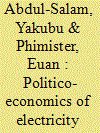| Srl | Item |
| 1 |
ID:
125412


|
|
|
|
|
| Publication |
2013.
|
| Summary/Abstract |
Water is required for energy supply, and energy is required for water supply, creating problems as demand for both resources grows. We analyze this "water-energy nexus" as it affects long-run electricity planning in the western United States. We develop four scenarios assuming: no new constraints; limits on carbon emissions; limits on water use; and combined carbon and water limits.
We evaluate these scenarios through 2100 under a range of carbon and water prices. The carbon-reducing scenarios become cost-effective at carbon prices of about $50-$70 per ton of CO2, moderately high but plausible within the century. In contrast, the water-conserving scenarios are not cost-effective until water prices reach thousands of dollars per acre-foot, well beyond foreseeable levels. This is due in part to the modest available water savings: our most and least water-intensive scenarios differ by less than 1% of the region's water consumption.
Under our assumptions, Western electricity generation could be reshaped by the cost of carbon emissions, but not by the cost of water, over the course of this century. Both climate change and water scarcity are of critical importance, but only in the former is electricity generation central to the problem and its solutions.
|
|
|
|
|
|
|
|
|
|
|
|
|
|
|
|
| 2 |
ID:
150356


|
|
|
|
|
| Summary/Abstract |
Off-grid technologies are increasingly being proposed as a way of ensuring cost efficient universal access to electricity in many developing countries. However, many un-electrified communities would prefer access to electricity via the national grid rather than off-grid technologies. Electricity planning based on cost efficiency alone could therefore be undermined by political pressure from discontented communities that are assigned off-grid technologies. Using a case study of un-electrified communities in Ghana, we develop an electricity planning algorithm based on hierarchical lexicographic programming and consider specifications where the priorities are adjusted to give weight to (1) cost efficiency and (2) political economy considerations so that communities with larger populations (and therefore votes) are given priority in terms of grid electrification. The results emphasise the need to incorporate the political economy considerations in the national planning of universal electrification, showing significant regional differences in terms of where grid extensions ought to be placed. Incorporating a political economy perspective in national planning also suggests that the most important policy trade-offs shift from considering the grid versus off-grid balance to focussing more on the effectiveness of grid investment in providing universal access.
|
|
|
|
|
|
|
|
|
|
|
|
|
|
|
|